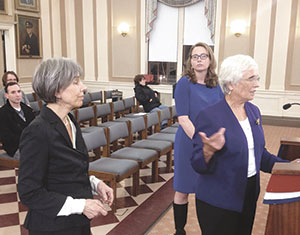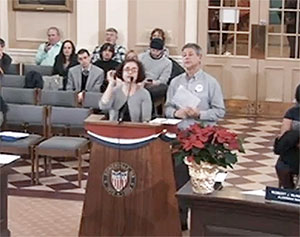
Left to right: State Reps. Denise Provost and Christine Barber, along with State Senator Pat Jehlen, addressed the Board, expressing their support for the proposed legislation.
By Jim Clark
The Somerville Board of Aldermen collected more than signatures from 195 registered voters at their December 10 regular meeting, petitioning the Board to hold a public hearing on economic inequality, pursuant to Section 8 of the City Charter.
Organized by a loose grouping of local labor and community activists presenting themselves as Good Jobs Somerville, the Board was asked to support four bills going before the state Legislature which would help to address problems caused by rising income inequality.
In addition to calling for a hearing on the issue of economic inequality, the submitted petition calls on the City of Somerville to support a number of bills before the state legislature that will help to address inequality. These include proposed legislation for paid family and medical leave that will ensure workers are not forced to choose between work and their own health needs or the well-being of their children and other family members.
A state Constitutional Amendment creating an additional tax of four percentage points on annual income above one million dollars to be invested in quality public schools, affordable higher education, and improvements in public transportation is also being proposed.
Additionally, a living wage for employees of big box retail and fast food companies so that people who work full-time for large, profitable corporations can earn a living wage of $15 an hour is being sought.
Elimination of the subminimum wage for tipped workers, providing restaurant workers with the same hourly minimum wage as workers in all other industries in Massachusetts is also part of the proposed legislation.
“Other cities around the country have passed local ordinances aimed at addressing economic inequality in their communities,” said Jesse Clingan, an activist for good jobs who collected dozens of signatures from his neighbors and friends. “We are hoping to follow their example and make Somerville a city that takes proactive measures to stop the growing problem of economic inequality.”

(L to R): Somerville teacher Gina Garro and SEIU Local 888 staffer Rand Wilson addressing the Board at the December 10 public hearing on income inequality.
SEIU Local 888 organizer Rand Wilson addressed the Board on the matter saying, “Between 1979 and 2007 real incomes of the richest one percent almost tripled, while the real incomes of regular households – people like us – inched up only about 25 percent. Meanwhile, that group of the richest one percent – some call them the billionaire class – owns about a third of our nation’s wealth.” Wilson continued by telling those present that the top five percent own over 60 percent of the wealth in this country.
“Over the last generation, over my lifetime, that share has grown steadily,” Wilson said. “And since the Great Recession, almost all of the gains since then in our so-called economic recovery have flowed only to the richest one percent.”
Wilson went on to say that among the world’s nations the U.S. is “dead last” on all of the relevant equality measures. “This is a disgrace,” said Wilson. “That inequality is growing at a faster rate in this country than in any other country.”
Several members of the community also addressed the Board, sharing their views on the economic inequality issue. Gina Garro, a teacher and MTA member, talked about the need for a new amendment to our state’s constitution to create an additional tax of four percentage points on annual incomes above one million dollars. Sagar Tivari, a fast food worker at Dunkin’ Donuts, described how hard it was to live in Somerville on low pay. Alex Galimberti, a Somerville restaurant worker and local leader of the Restaurant Opportunity Center (ROC), reaffirmed the city’s previous commitment to the elimination of the subminimum wage for tipped workers. Marya Axner, director of the Jewish Labor Committee and Alex Pirie, from Immigrant Service Providers talked about the need to pass new legislation for paid family and medical leave to ensure that workers are not forced to choose between work and the well-being of their children and other family members.
At one point in the presentation, Board of Alderman President William A. White Jr. noted that the 20 wealthiest individual in the U.S. collectively own more than the bottom one half of the entire population.
In addition, State Senator Pat Jehlen, and Representatives Denise Provost and Christine Barber all spoke in support of the bills.
After hearing public testimony, the Board voted unanimously to support the four bills.
“Somerville’s Board of Aldermen took an important symbolic first step to support passage of four state initiatives which, if passed, will improve working families’ lives,” said Wilson after the vote. “In doing so, the board acknowledged the significance of economic inequality and its corrosive impact on our community. Now the hard work must begin to win very specific municipal reforms so that our city government can more aggressively use its power to make sure the wealth we create stays in our community and goes to where it’s most needed, Somerville’s hard-working families.”
















Reader Comments